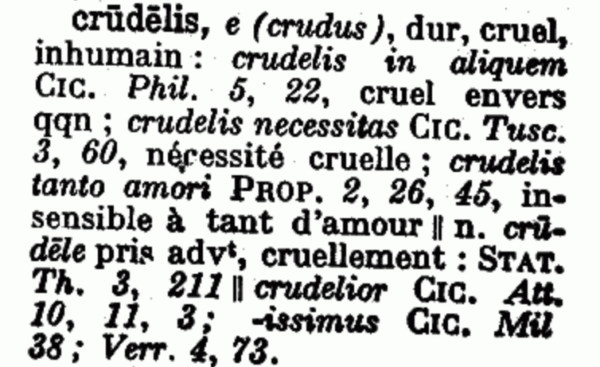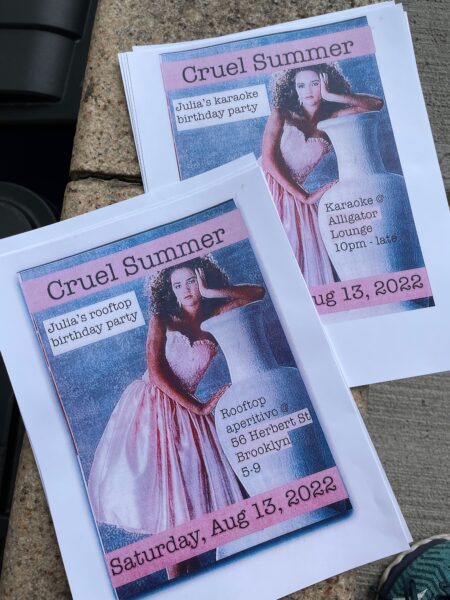In this week’s Word Poem, we’re going to look at the word, cruel. Lately I’ve been having a series of nightmares about something that I found to be, well, cruel. It’s also hard not to read the news and find a story that is not about cruelty. I will save you any descriptions. I think we can use a break from the current news cycle.
In this post, we’re going to explore the definitions, variations, etymology and linguistic derivatives, one popular culture usage, synonyms, and antonyms of the word, cruel, and a call to action. Somehow, this word has roots in the English language dating as far back as the 13th Century AD. I don’t understand how anyone can be cruel, and to be so cruel that we needed a word to describe such an action, and this word is practically the same in a dozen languages. I hope that this inspires you, dear reader, to be the antonym.
Word: Cruel
Adjective:
cruel | cru·el
Pronounciation: ˈkrü(-ə)l, krul (US English) | ˈkruː.əl, kru:l (British English)
Cruel: Definition
1
: description (of a person) that means to cause pain or suffering, willfully or without feeling any concern
: description (of a person) disposed to inflict pain or suffering
: devoid of humane feelings
: (of a person) morally rude or unfeeling
: a stronger way of saying mean in reference to a person’s actions or behaviors
Example: a cruel tyrant (where object of the sentence could be a person)
2
: (of a person, thing, or action) causing or conducive to injury, grief, or pain
: extremely unkind and unpleasant
: (of a person or action) causing pain to humans or animals intentionally.
Example: a cruel joke, a cruel twist of fate (where object of the sentence could be a physical or metaphorical object or an action)
3
: unrelieved by leniency
: (of an action or event) causing suffering
: being extremely or unnecessarily unfair (as in to a person)
: being interrogated in an unfair manner
: of a punishment that is rejected by society and completely disproportionate to the crime in question.
Example: cruel punishment (where object of the sentence is an action or event)
Cruel: Variations
Adjective:
crueler or crueller; cruelest or cruellest
Adverb:
cruelly | ˈkrü-(ə-)lē
Noun:
cruelness
Etymology of the Word, Cruel
The origins of the word cruel come from Middle English and Anglo-French. It is derived from the Latin word crudelis, which was further descended from crudus. The first known use of cruel dates back to the Middle Ages and was used in a similar way as Merriam Webster’s first definition: “disposed to inflict pain or suffering” or “devoid of humane feelings.”

In the screenshot on the left, the definition of “crudelis” appears in Dictionnaire illustré latin-français, a Latin-French dictionary by Felis Gaffiot and published by Hachette in 1934.
The word “cruel” is written the same in multiple languages that also originate from Latin, including Asturian, Catalan, English, French, Galician, Portuguese, and Spanish. There are various forms of the word that appear in different Italian dialects, from Venetian’s crudel to Sicilian’s crudili.

Oxford English Dictionary traces the earliest evidence of the word “cruel” to the text, Ancrene Riwle. Ancrene Riwle, or “The Rule for Anchoresses,” is a series of seven manuscripts that were composed in Middle English between 1225 and 1240 by an unknown, religious man in the old West Saxon kingdom. For context, Anchorites (male) and Anchoresses (female) were people in the Middle Ages who withdrew from secular society to lead a pious and prayer-oriented life and often lived in cells close to churches. Acrene Riwle was later retitled to Ancrene Riwle.
In a blog post from 2020, the web author, Thomas Hillman, finds the word in Ancrene Riwle in a passage that describes a father and a mother, which could be interpreted as figuratively or literally. He looks at a translation of Ancrene Riwle by Lord of the Rings author, JRR Tolkien, in the following passage:
‘He put himself between us and his Father who was threatening to smite us, just as a mother who is merciful puts herself between her child and the wrath of a stern father when he wishes to beat him’. . . Justice’, he says, ‘must necessarily be stern’, and thus he dyes cruelty with the hue of righteousness. But one may be all too righteous. ‘Be not excessively just.’ [It says] in Ecclesiastes.In this passage, we see “cruelty” referenced in direct contrast to righteousness (the quality of being morally right or justifiable). There are religious overtones in this text, and both extremes appear eerily recognizable.
Synonyms of Cruel
atrocious : barbaric : barbarous : brutal : brute : butcherly : callous : fiendish : hard : heartless : inhuman : inhumane : malicious : rude : ruthless : sadistic : savage : truculent : unmerciful : vicious : wanton
Antonyms of Cruel
benevolent : compassionate : merciful : kind : righteousness : YOU
Popular Culture

There are numerous titles of movies, songs, and other art forms in the popular culture discourses that reference and describe the word, cruel. My personal favorite? The 1983 New Wave pop hit, “Cruel Summer” by Bananarama. (This will come as no surprise to my closest friends). I figured I’d mention it, considering the current weather forecast for this upcoming holiday weekend is 90 degrees in New York City. Do you want to know what that looks like? Watch the official video and feel the hot asphalt as the group dances through the city:
Top Image: Screenshot from the Bananarama music video

Image on right: “Cruel Summer” poster for a private event at Alligator Lounge.
Side note: I finished Season 2 of the Rehearsal, and the show made me nostalgic for Kings of Karaoke nights at the bar.
Call To Action
Be the antonym.
Sources
Dictionaries referenced:
- Cambridge Dictionary, https://dictionary.cambridge.org/us/dictionary/english/cruel
- An Elementary Latin Dictionary, https://www.perseus.tufts.edu/hopper/text?doc=Perseus:text:1999.04.0060:entry=crudelis
- The Latin Dictionary, http://latindictionary.wikidot.com/adjective:crudelis
- Merriam-Webster, https://www.merriam-webster.com/dictionary/cruel
- Oxford English Dictionary, https://www.oed.com/dictionary/cruel_adj
- Wikipedia, https://en.wikipedia.org/wiki/Cruelty
- Wiktionary, https://en.wiktionary.org/wiki/crudelis
More discussions:
- r/AskALiberal – > https://www.reddit.com/r/EnglishLearning/comments/ng0onz/whats_the_difference_between_being_mean_cruel_and/
- r/English Learning – > https://www.reddit.com/r/AskALiberal/comments/v3uxme/how_would_you_define_cruel_and_unusual_punishment/
- r/Nihilism – > https://www.reddit.com/r/nihilism/comments/1fnbe6f/why_is_human_nature_so_cruel/
- r/NoStupidQuestions – > https://www.reddit.com/r/NoStupidQuestions/comments/1fmbuzq/whats_the_appeal_of_being_cruel/
- r/Stoicism – > https://www.reddit.com/r/Stoicism/comments/15e4b2l/stoic_reminder_the_world_is_cruel_so_lets_not_be/
References on Ancrene Riwle / Ancrene Wisse:
- For a summary, read “Ancrene Riwle” (https://www.bsswebsite.me.uk/History/AncreneRiwle/AncreneRiwle.html)
- J.R.R. Tolkien’s edition of the medieval manuscript is open source and available to read at the Internet Archive. The book is published by the Oxford University Press in 1962, commissioned by the Early English Text Society. Link: https://archive.org/details/ancrene-wisse/page/100/mode/1up
- The criticism that is referenced under Etymology is sourced from here: Hillman, Thomas. “Again, sternly, ‘with other vision’ (RK 6.iii.945).” Alas, Not Me (Blogspot). 9 May 2020. https://alasnotme.blogspot.com/2020/05/again-sternly-with-other-vision-rk.html